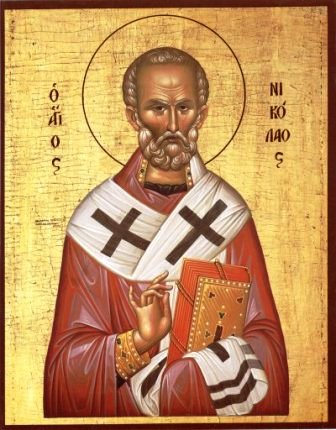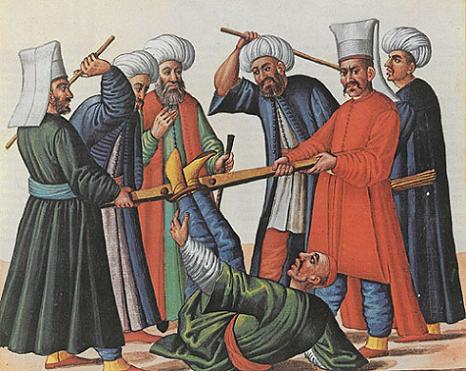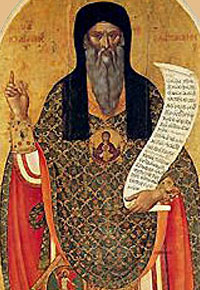|
|
+++ St Nicolas the Wonderworker, Archbishop of Myra in Lycia - St. Nicholas Day This saint, famed throughout the entire world today, was the only son of his eminent and wealthy parents, Theophanes and Nona, citizens of Patara in Lycia. They dedicated to God the only son He gave them. St Nicolas was instructed in the spiritual life by his uncle Nicolas, Bishop of Patara (see below), and became a monk at 'New Sion', a monastery founded by his uncle. On the death of his parents, Nicolas distributed all the property he inherited to the poor and kept nothing back for himself. As a priest in Patara, he was known for his charitable works, fulfilling the Lord's words: 'Let not thy left hand know what thy right hand doeth' (Matt. 6:3). When he embraced a life of solitude and silence, thinking to live in that way until his death, a voice from on high came to him: 'Nicolas, set about your work among the people if you desire to receive a crown from Me.' Immediately after that, by God's wondrous providence, he was chosen as archbishop of the city of Myra in Lycia. Merciful, wise and fearless, Nicolas was a true shepherd to his flock. He was cast into prison during the persecutions of Diocletian and Maximian, but even there continued to instruct the people in the Law of God. He was present at the First Ecumenical Council in Nicaea in 325, and, in his zeal, struck Arius with his hand. For this act, he was removed from the Council and from his episcopal duties, until some of the chief hierarchs had a vision of our Lord Christ and His most holy Mother showing their sympathy with Nicolas.
This wonderful saint was a defender of the truth of God, and was ever a spirited champion of justice among the people. On two occasions, he saved three men from undeserved sentences of death. Merciful, trustworthy and loving right, he walked among the people like an angel of God. People considered him a saint even during his lifetime, and invoked his aid when in torment or distress. He would appear both in dreams and in reality to those who called upon him for help, responding speedily to them, whether close at hand or far away. His face would shine with light as Moses' did aforetime, and his mere presence among people would bring solace, peace and goodwill. In old age, he sickened of a slight illness, and went to his rest in the Lord after a life full of labour and fruitful toil. He now enjoys eternal happiness in the Kingdom of heaven, continuing to help the faithful on earth by his miracles, and to spread the glory of God. He entered into rest on December 6th, 343. This saint, famed throughout the entire world today, was the only son of his eminent and wealthy parents, Theophanes and Nona, citizens of Patara in Lycia. They dedicated to God the only son He gave them. St Nicolas was instructed in the spiritual life by his uncle Nicolas, Bishop of Patara (see below), and became a monk at 'New Sion', a monastery founded by his uncle. On the death of his parents, Nicolas distributed all the property he inherited to the poor and kept nothing back for himself. As a priest in Patara, he was known for his charitable works, fulfilling the Lord's words: 'Let not thy left hand know what thy right hand doeth' (Matt. 6:3). When he embraced a life of solitude and silence, thinking to live in that way until his death, a voice from on high came to him: 'Nicolas, set about your work among the people if you desire to receive a crown from Me.' Immediately after that, by God's wondrous providence, he was chosen as archbishop of the city of Myra in Lycia. Merciful, wise and fearless, Nicolas was a true shepherd to his flock. He was cast into prison during the persecutions of Diocletian and Maximian, but even there continued to instruct the people in the Law of God. He was present at the First Ecumenical Council in Nicaea in 325, and, in his zeal, struck Arius with his hand. For this act, he was removed from the Council and from his episcopal duties, until some of the chief hierarchs had a vision of our Lord Christ and His most holy Mother showing their sympathy with Nicolas.
This wonderful saint was a defender of the truth of God, and was ever a spirited champion of justice among the people. On two occasions, he saved three men from undeserved sentences of death. Merciful, trustworthy and loving right, he walked among the people like an angel of God. People considered him a saint even during his lifetime, and invoked his aid when in torment or distress. He would appear both in dreams and in reality to those who called upon him for help, responding speedily to them, whether close at hand or far away. His face would shine with light as Moses' did aforetime, and his mere presence among people would bring solace, peace and goodwill. In old age, he sickened of a slight illness, and went to his rest in the Lord after a life full of labour and fruitful toil. He now enjoys eternal happiness in the Kingdom of heaven, continuing to help the faithful on earth by his miracles, and to spread the glory of God. He entered into rest on December 6th, 343.St Nicolas, Bishop of PataraThe uncle of the great St Nicolas, he set his nephew on the spiritual path and ordained him priest.
The Holy Martyr Nicolas of Karamanos He was harshly tortured by the Turks, and was hanged in Smyrna in 1657. He was harshly tortured by the Turks, and was hanged in Smyrna in 1657.St Theophilus, Bishop of Antioch A man well-versed in Hellenistic philosophy, he became a Christian through reading the Holy Scriptures and became a great champion of the Christian faith. His work 'On the Faith' is extant today. He governed the Church in Antioch for thirteen years, and went to his rest in the year 181. A man well-versed in Hellenistic philosophy, he became a Christian through reading the Holy Scriptures and became a great champion of the Christian faith. His work 'On the Faith' is extant today. He governed the Church in Antioch for thirteen years, and went to his rest in the year 181. |